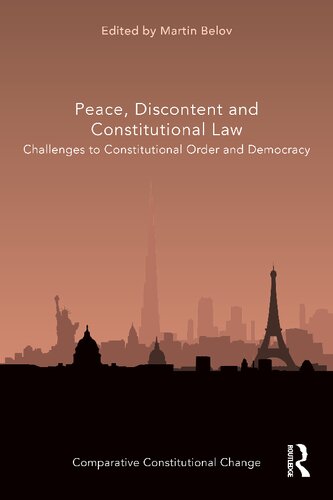

Most ebook files are in PDF format, so you can easily read them using various software such as Foxit Reader or directly on the Google Chrome browser.
Some ebook files are released by publishers in other formats such as .awz, .mobi, .epub, .fb2, etc. You may need to install specific software to read these formats on mobile/PC, such as Calibre.
Please read the tutorial at this link: https://ebookbell.com/faq
We offer FREE conversion to the popular formats you request; however, this may take some time. Therefore, right after payment, please email us, and we will try to provide the service as quickly as possible.
For some exceptional file formats or broken links (if any), please refrain from opening any disputes. Instead, email us first, and we will try to assist within a maximum of 6 hours.
EbookBell Team

4.7
26 reviewsThis book offers a multi-discursive analysis of the constitutional foundations for peaceful coexistence, the constitutional background for discontent and the impact of discontent, and the consequences of conflict and revolution on the constitutional order of a democratic society which may lead to its implosion. It explores the capacity of the constitutional order to serve as a reliable framework for peaceful co-existence while allowing for reasonable and legitimate discontent. It outlines the main factors contributing to rising pressure on constitutional order which may produce an implosion of constitutionalism and constitutional democracy as we have come to know it. The collection presents a wide range of views on the ongoing implosion of the liberal-democratic constitutional consensus which predetermined the constitutional axiology, the institutional design, the constitutional mythology and the functioning of the constitutional orders since the last decades of the 20th century. The constitutional perspective is supplemented with perspectives from financial, EU, labour and social security law, administrative law, migration and religious law. Liberal viewpoints encounter radical democratic and critical legal viewpoints. The work thus allows for a plurality of viewpoints, theoretical preferences and thematic discourses offering a pluralist scientific account of the key challenges to peaceful coexistence within the current constitutional framework.
The book provides a valuable resource for academics, researchers and policymakers working in the areas of constitutional law and politics.